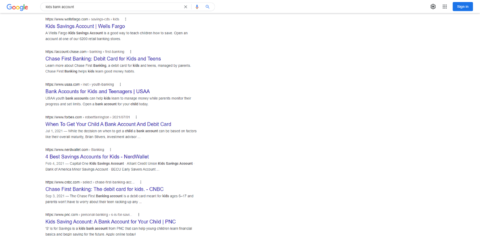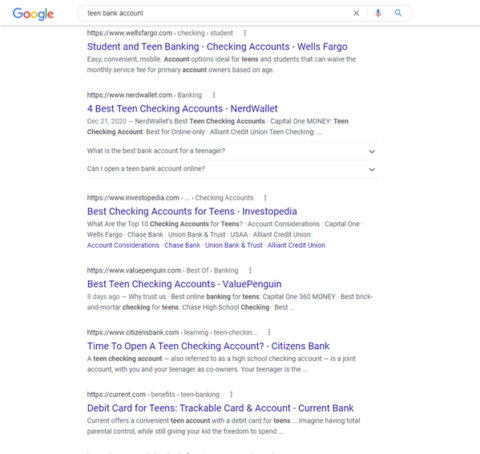For years, the SEO community has been obsessed with keyword rankings as one of many viable metrics to prove the value of SEO.
At the end of the day, rankings are important – but only when they drive business value i.e. traffic, revenue and conversions.
Google has become much smarter and better at understanding user intent, and the algorithms now have a better sense of context and meaning, so keywords should always connect with your content.
Are keywords still important today?
There is no short answer to this. If you ask whether keywords in queries are essential to provide a list of relevant files to satisfy an informational need, then the answer is no.
But if you ask if keywords matter to Google’s indexing and retrieval system, the answer is absolutely yes.
Let’s take a closer look.
Why Keywords Matter in SEO
Keywords are the key phrases commonly used by consumers to find what they are looking for online. They use the search bar in their browser to type in the terms, which are usually made of one or more words that describe what they want.
Advertisement
Continue Reading Below
There are many types of keywords including:
- Branded.
- Non-Branded.
- Local and Global.
- Brand + Geography.
- Brand + Product, etc.
Here are four ways keywords continue to help brands.
1. Keywords Help Indicate User Intent
Keywords are directional. They give very good clues that “point” to the kind of content the searcher is trying to retrieve.
But there is still a vocabulary problem between the index system and end users, who have many different ways to ask for the same thing or something similar.
This is why Google and other search engines have extremely advanced query expansion technologies.
For example, an end user typing “fish tank” as a query may well see the first result for a tropical fish aquarium, which may be more relevant and useful to satisfy the informational need than another page that only has the direct match to the words “fish” + “tank” to qualify it.
Advertisement
Continue Reading Below
Plus, timestamps appended to keywords in the index for temporal analysis give a clue to freshness to help detect trends, and then there has to be event detection for news results. And so much more…
So, yes, the closer a user can get the query to match the relevant content, the better.
However, users tend to not know what they’re looking for (if they did, they wouldn’t need a search engine), so search engines must be sophisticated with definition and association discovery.
2. Keywords Help Find Striking Distance Opportunities
When I do research on a prospect, I always look at visibility to get an idea of what keyword rank is in different zones, like striking distance, developmental, etc.
For example, a previous client was in striking distance for the search term “business consulting.”
I examined the page to see why they were not ranking on page one for their targeted keyword and noticed the page did not incorporate all the topics associated with business consulting and they needed to expand the content to be more holistic.
Once they expanded the content based on our recommendations, we built external links and got them to rank on page one for “business consulting” in three months.
See Python SEO Script: Top Keyword Opportunities Within Striking Distance for a simple script with step-by-step instructions to help make this process faster and easier.
3. Keywords Help Identify the Right Target Audience
When we perform competitive analysis and look at keyword visibility for a prospect or current client versus the competitive set, we can uncover a content gap.
We could find they don’t have content to serve that topic, or that the content they have is not ranking or optimized.
For example, I previously had a financial client that wanted to rank for “kids bank account.”
After looking at competitor visibility, we noticed competitors ranked for “teen bank account” and my client did not have “teen checking account” in their page title, headings, body content, etc. and therefore did not rank for the term.
Advertisement
Continue Reading Below
But kids and teens are not synonymous.
Once we developed content for “teen bank account” instead and optimized it, marked it up with schema, built content around it, did some internal linking, promoted the content, etc., conversions rates increased by 13% YOY.
The keyword “teen bank account” helped us identify the proper target audience.
 Screenshot by author, November 2021.
Screenshot by author, November 2021.Notice only one site, USAA, has any teen keywords in the title. The screenshot below shows no websites that rank in the top 10 have “kid bank account” in the title.
 Screenshot by author, November 2021
Screenshot by author, November 20214. Keywords Help Drive Traffic
It’s no secret that the vast majority of clicks occur on the first page of Google; in fact, the top result alone takes 28.5% of the clicks.
Advertisement
Continue Reading Below
So, for example, since SEO.com ranks #1 for “SEO company,” a term that has 16K queries per month, that 28.5% of clicks should translate to 4,560 visits from that single keyword every month.
If you increase visibility into the first page, your site can drive a considerable amount of incremental traffic, which can potentially lift sales on keywords that have high volume.
Having a top position on a low-volume keyword is not meaningful. Instead, focus your efforts on keywords with high volume and holistic content that answers questions end users will find useful.
Far too many clients and articles focus on counting keyword success stories instead of measuring the impact of those successes (or not).
Getting a single keyword onto page 1 could very well be more impactful to a brand than getting 100 keywords into position 1.
Should We Still Track Keywords?
The answer here is an overwhelming yes: Keywords do still provide value by delivering traffic, conversions, visibility and sales in prime positions.
Advertisement
Continue Reading Below
For enterprise-level brands with a lot of products and services, it can be expensive to track keywords because there can be thousands or millions of keywords to monitor across desktop and mobile.
It’s a great idea to keep a golden keyword list of terms that deliver the most business value to your brand, i.e., traffic, revenue and conversions, and a mixture of non-brand, brand, and product keywords that are vital to your first-page visibility.
A brand wants to know what its highest volume terms are doing and get as much traffic as possible from those keywords. It makes sense to track a few hundred keywords per core business line and region for enterprise-level brands.
Tips For Finding The Right Keywords
Before you start using a wide variety of keyword research tools, always think like a customer and ask, “What is the purpose of my website and what problem am I going to help end users solve?”
If you can answer that question, you are on the right path to defining your audience and your keyword strategy.
Advertisement
Continue Reading Below
For example, I was having some decorating done in my apartment a few weeks ago.
The guy from the company was talking about a specific kind of coating that could be used on window frames. I had no idea such a thing existed—and if I don’t know it exists, I have no idea how to find it.
So I have to describe the problem to Google to find the solution.
All clients should think like the end user and start their content with a description of the problem before they start tooting their horn about their great solution.
One of the keyword research data sources I like to use is paid search data if it is available. If you have historical paid search data, you can see which keywords resulted in conversions and sales, which can help define what content you should create.
Read How to Do Keyword Research for SEO: The Ultimate Guide for more.
At the end of the day, SEO is all about delivering qualified traffic that converts into customers. If your site is receiving a lot of traffic and no one converts, what is the point?
Advertisement
Continue Reading Below
(Unless, of course, you have a site that depends on ad revenue, affiliate traffic, or any other advertising model.)
When Keywords Are Actually Useless
It’s 2021, and we still see sites and SEO pros focusing on keyword density. News flash: Keyword density does not matter.
Stop trying to stuff keywords into content—it won’t help you get higher rankings if you have your primary keyword at 10% KD, etc.
Focus on writing content that will satisfy the informational need and give users what they want.
I also still see sites using the keyword meta tags. Google devalued that a long time ago and it has no ranking value and won’t move the needle.
Lastly, using exact match anchor text for all your links is not a good idea. Anchor text should be a mixture of brand and non-brand with different keyword variations.
Google is sophisticated and if you have too many keywords with exact match anchor text links, you can send off an alarm and your site can potentially get penalized.
Advertisement
Continue Reading Below
Wrapping Up
Keywords can provide business value when prospects and clients are ranking on the first page of Google for high-volume terms, where 90+% of clicks occur.
Running ranking reports and looking at keywords that rank in different visibility zones can help uncover opportunities to create new content or expand the current content for existing landing pages.
Keywords will be around for a while and will continue to be used as a signal that gives clues that point to the kind of content the searcher is trying to retrieve from an organic search perspective.
More resources:
Featured image: Shutterstock/Sammby
